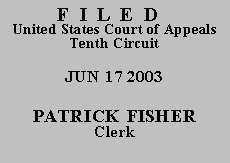

v.
SANDIA CASINO; FELIX L.
CHAVES; STUWART PAISANO;
and JOHN DOES
LOIS JEAN CURTIS,
ORDER AND JUDGMENT(*)
Before SEYMOUR, MURPHY, and O'BRIEN, Circuit Judges.
After examining the briefs and appellate record, this panel has determined
unanimously that oral argument would not materially assist the determination of
this appeal. See Fed. R. App. P. 34(a)(2); 10th Cir. R. 34.1(G). The case is
therefore ordered submitted without oral argument.
Lois J. Curtis, acting pro se,(1) appeals the district court's dismissal(2) of her complaint under Fed. R. Civ. P. 12(b)(1) for lack of subject matter jurisdiction. Exercising jurisdiction under 28 U.S.C. § 1291 (2003), we affirm.
Ms. Curtis, a Hispanic woman with a history of physical disability was employed by the Sandia Casino ("Casino"). The Casino was owned and operated by the Pueblo of Sandia, a federally recognized Indian tribe located in New Mexico. On June 26, 2002, Ms. Curtis filed suit in federal court alleging the Casino, Casino officials, the Governor of the Pueblo of Sandia, and unnamed John Does forced her to resign her management position at the Casino in November 2001 because of her race, disability and age. (She was sixty-eight years old in November 2001.) She asserted federal and state law claims of employment discrimination(3) and sought damages and injunctive relief.
The district court correctly construed her federal claims as brought against the Pueblo of Sandia under Title VII of the Civil Rights Act of 1964,(4) 42 U.S.C. § 1981, the Americans With Disabilities Act (ADA),(5) and the Age Discrimination in Employment Act (ADEA).(6) The magistrate judge concluded in a memorandum opinion and order filed September 13, 2002, that these enactments do not confer jurisdiction on the federal courts to hear complaints against sovereign Indian tribes.(7) We review de novo the dismissal of a complaint for lack of subject matter jurisdiction under Fed. R. Civ. P. 12(b)(1). King v. United States, 301 F.3d 1270, 1273 (10th Cir. 2002), cert. denied, 2003 WL 396176 (U.S. June 16, 2003) (No. 02-1178).
Ms. Curtis' Title VII claim fails because Title VII precludes jurisdiction over employment discrimination claims against Indian tribes. 42 U.S.C. § 2000e(b)(1); Morton v. Mancari, 417 U.S. 535, 545-46 (1974); Duke v. Absentee Shawnee Tribe of Okla. Hous. Auth., 199 F.3d 1123, 1126 (10th Cir. 1999), cert. denied, 529 U.S. 1134 (2000). Her § 1981 claim mirrors her Title VII claim. It fails because the more specific statutory enactment of Title VII controls the subject matter. Mancari, 417 U.S. at 550-51; Wardle v. Ute Indian Tribe, 623 F.2d 670, 673 (10th Cir. 1980). Her ADA claim fails because the ADA excludes Indian tribes as employers subject to suit. 42 U.S.C. § 12111(5)(B)(i). Finally, her ADEA claim fails because the ADEA does not apply to Indian tribes. EEOC v. Cherokee Nation, 871 F.2d 937, 939 (10th Cir. 1989).
Accordingly, we adopt the reasoning of the district court and AFFIRM.
Entered by the Court:
TERRENCE L. O'BRIEN
United States Circuit Judge
*. This order and judgment is not binding precedent except under the doctrines of law of the case, res judicata and collateral estoppel. The court generally disfavors the citation of orders and judgments; nevertheless, an order and judgment may be cited under the terms and conditions of 10th Cir. R. 36.3.
1.We liberally construe a pro se appellate brief. Ledbetter v. City of Topeka, 318 F.3d 1183, 1187 (10th Cir. 2003).
2.The parties consented to disposition by a magistrate judge. See 28 U.S.C. § 636(c) (2003); Fed. R. Civ. P. 73(b).
3.Ms. Curtis presumably expected the district court to exercise supplemental jurisdiction over her state law claims under 28 U.S.C. § 1367 (2003).
4.42 U.S.C. § 2000e-2, e-3.
5.42 U.S.C. § 12112.
6.42 U.S.C. § 623.
7.With the failure of the federal claims, the district court correctly declined supplemental jurisdiction over the state court claims. See 28 U.S.C. § 1367(c)(3).